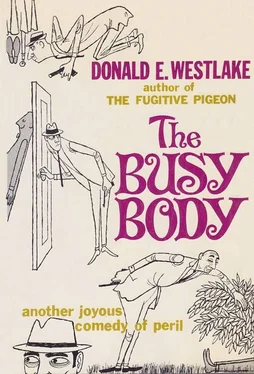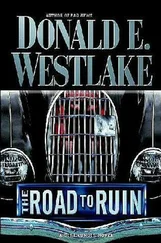Donald Westlake - The Busy Body
Здесь есть возможность читать онлайн «Donald Westlake - The Busy Body» весь текст электронной книги совершенно бесплатно (целиком полную версию без сокращений). В некоторых случаях можно слушать аудио, скачать через торрент в формате fb2 и присутствует краткое содержание. Город: New York, Год выпуска: 1966, Издательство: Random House, Жанр: Иронический детектив, на английском языке. Описание произведения, (предисловие) а так же отзывы посетителей доступны на портале библиотеки ЛибКат.
- Название:The Busy Body
- Автор:
- Издательство:Random House
- Жанр:
- Год:1966
- Город:New York
- ISBN:нет данных
- Рейтинг книги:5 / 5. Голосов: 1
-
Избранное:Добавить в избранное
- Отзывы:
-
Ваша оценка:
- 100
- 1
- 2
- 3
- 4
- 5
The Busy Body: краткое содержание, описание и аннотация
Предлагаем к чтению аннотацию, описание, краткое содержание или предисловие (зависит от того, что написал сам автор книги «The Busy Body»). Если вы не нашли необходимую информацию о книге — напишите в комментариях, мы постараемся отыскать её.
The Busy Body — читать онлайн бесплатно полную книгу (весь текст) целиком
Ниже представлен текст книги, разбитый по страницам. Система сохранения места последней прочитанной страницы, позволяет с удобством читать онлайн бесплатно книгу «The Busy Body», без необходимости каждый раз заново искать на чём Вы остановились. Поставьте закладку, и сможете в любой момент перейти на страницу, на которой закончили чтение.
Интервал:
Закладка:
“It’s getting complicated, Nick.”
“Then make it simple. The simple thing is, Nick Rovito wants the suit.”
“I know, Nick.”
“It ain’t the profit, it’s the principle. Nick Rovito don’t get robbed.”
Engel knew that when Nick Rovito started talking about himself in the third person it meant his pride was hurt, his back was up, and his mind was set. So all he said was, “I’ll get it, Nick, I’ll get the suit.”
“Good,” said Nick Rovito. Click, said the phone.
Engel hung up. “The suit,” he muttered to himself. He looked around the room, as though to find it somewhere here, maybe hanging on the back of a chair or draped over a bar stool. “Where the hell,” he said aloud, “am I going to find that goddam suit?” When he got no answer, he drained his glass and turned toward the bar to make himself another drink.
Halfway there he was detoured by the sound of the doorbell ringing: a chimed quote from “L’Après-midi d’un faune,” an inheritance from the designer. Frowning, Engel set the empty glass down on the bar, went out to the foyer, and opened the door.
Standing there was the mystery woman, all in black. “Mr. Engel?” she said, and smiled prettily. “May I come in? I believe I owe you an explanation.”
10
Was she twenty? Was she thirty-five? More or less or in between? There was no way to tell.
Again, was she insane, or was she merely mindless, or some combination of the two? And again, as yet there was no way to tell.
Engel closed the door after she’d stepped into the apartment, and followed her into the living room, which she admired by turning around in a smiling circle and saying, “What an interesting place! How fascinating! How original!”
If there was one thing life had taught Engel, it was Wait and See. Don’t ask, don’t assume, don’t jump the gun, don’t try to hurry the world along, just Wait and See. If Madame X here intended to give him an explanation, fine; she’d do it at her own speed and in her own way, and in the meantime Engel would have an unusually fine opportunity to practice Wait and etc. So, coming into the living room after her, he merely said, “You want a drink?”
“Scotch sour?”
“Scotch sour. Right.”
A Scotch sour was unfortunately not one of the drinks he could dial on his electric dispenser, so, as he went around behind the bar, he snaked out the drink guide he’d brought home one time from the liquor store, leafed through it hurriedly while keeping it hidden under the bar, and said, “Sit down, why don’t you? I’ll just be a minute.”
It was a good thing he’d maintained his predecessor’s tradition of a broadly stocked bar, including the refrigerated compartment underneath. A Scotch sour, it seemed, required one each of almost everything he had. While he assembled it, feeling like the witch in “Snow White,” his guest wandered around the living room, admiring the furnishings and the objects on the walls; a murky lightning-streaked abstract entitled “Summer Storm Fire Island” (designer), a primary-hued naturalistic portrait of a sad-faced clown (producer), and matched plaques of ducks in flight (Engel’s mother). “How catholic! How unusual!”
Engel made himself a fresh Scotch and water and carried the two drinks over to where she stood by a side table, admiring its burden of fat red candles (designer) and fat orange oriental wood carvings (producer), plus this week’s issue of Time (Engel). “Scotch sour,” said Engel.
“Ah!” She spun around like a high school girl, all smiles and dimples, but the hand with which she took the drink was pale white and so slender as to be almost bony. But not unpleasantly so, no, not at all unpleasantly so. “Thank you,” she said, and raised the glass, and over it batted at him eyes that belonged to no high-schooler. And the voice? Husky one instant, lilting the next, always interesting.
“Well sit,” suggested Engel, and motioned at the sofa.
“Fine,” she said, and moved at once to a Victorian chair with wooden arms and a seat covered in purple burlap. There she sat, crossed long legs with a nylon rustle, tugged at the hem of her black skirt to cover her knee, and said, “Now we can talk.”
“Good.” Engel settled himself on the sofa.
“What I can’t understand,” she said, smiling brightly at him, “is how one man can be so eclectic.”
Engel couldn’t understand it either, since he didn’t know the word, so he said, “How did you find me?”
“Oh,” she said, offhand, airily waving the hand with the glass in it, “I heard that policeman say your name, and I asked around, and here I am.”
“Asked around where?”
“Police Headquarters, of course.” She sipped at her drink, giving him the eyes again over the rim of the glass. “I’ve just come from there.”
Engel automatically glanced toward the front door. If his sense of timing was right there’d be cops at that door within about half an hour now. Callaghan and company would be slowed down by their imprisonment in the alley, and further slowed down by the confusion of identities back at the grief parlor, but sooner or later they’d get themselves organized and on the move, and when that happened a couple of their foot soldiers would stop by here just to check. Not that they’d expect to find him here, but just because they liked to think of themselves as thorough. The phantom lady’s mention of Police Headquarters reminded him of this, and so he automatically glanced toward...
Come from there?
He said it aloud: “Come from there? Police Headquarters?”
“Well, of course.” She lowered the glass from her lips, and smiled at him with the wattage and intensity of a toothpaste ad. “I couldn’t leave everything all mixed up, could I?”
“Oh, no,” he said, “of course not. You couldn’t do that.”
All at once the smile shrank from her face, and her expression became troubled. “Isn’t there,” she said, a new vibrato trembling in her voice, “isn’t there enough sadness and worry and confusion in the world already?”
“I’d say so,” he said.
“So as soon as I recovered,” she said, the tremolo lessening but still slightly present, “and realized what I’d done, I went straight to Police Headquarters. They didn’t know a thing about it yet, and they had a terrible time finding all those policemen who were chasing you, but I did explain things and they won’t chase you any more after this. They promised me.”
“They promised you.”
“Yes.” The smile flashed on again, like a searchlight being switched on, and she said, “The police are really very sweet, when you get to know them.”
“I wouldn’t know.”
“Of course,” she said, “they couldn’t understand why you’d run away like that if you hadn’t done anything wrong, but I understood it right away.”
“You did.”
“Well, of course. All at once someone accuses you of something perfectly dreadful, and a whole army of policemen start running at you... I’d have run away myself.”
“But you explained it,” said Engel. “You went to the cops and explained it so they won’t chase me.”
“Well, I thought I should. I thought it was my duty.” She sipped, eyed, smiled, said, “You make a really fine Scotch sour, really fine.”
“I wish,” Engel told her, “I kind of wish you’d explain it to me. What you explained to the cops.”
“Well, that’s why I’m here. You see, when my — Oh. May I have another of these first?”
“Sure. Sure.” Engel got to his feet, took the empty glass from her outstretched hand, and went back over behind the bar. He’d left the drink guide open, and now he began again to assemble the drink. One cocktail shaker, half full of cracked ice...
Читать дальшеИнтервал:
Закладка:
Похожие книги на «The Busy Body»
Представляем Вашему вниманию похожие книги на «The Busy Body» списком для выбора. Мы отобрали схожую по названию и смыслу литературу в надежде предоставить читателям больше вариантов отыскать новые, интересные, ещё непрочитанные произведения.
Обсуждение, отзывы о книге «The Busy Body» и просто собственные мнения читателей. Оставьте ваши комментарии, напишите, что Вы думаете о произведении, его смысле или главных героях. Укажите что конкретно понравилось, а что нет, и почему Вы так считаете.












